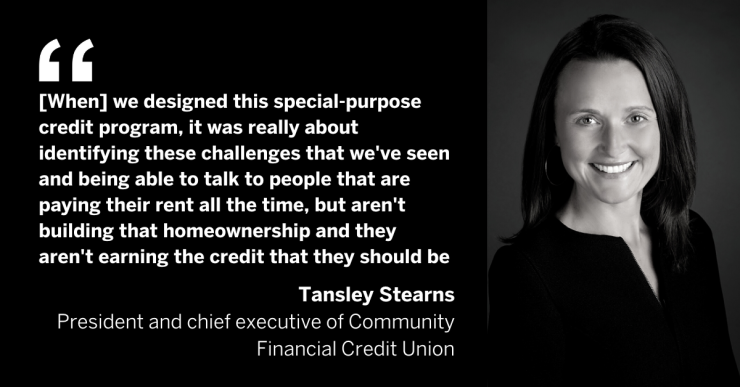
Nick Hagen
Community Financial Credit Union in Plymouth, Michigan, is working with a well-known home renovation duo to help mortgage applicants across metropolitan Detroit buy their first home.
The $1.5 billion-asset credit union debuted its partnership with NINE Design and Homes this month to help highlight its Path to Homeownership mortgage, which was developed for consumers who live in communities where it is hard to build generational wealth through homeownership.
“[When] we designed this special-purpose credit program, it was really about identifying these challenges that we’ve seen and being able to talk to people that are paying their rent all the time, but aren’t building that homeownership and they aren’t earning the credit that they should be,” said Tansley Stearns, president and chief executive of CFCU.
Appraisal gaps — wherein appraisal values come in lower than would be expected — disproportionately affect majority Black and Hispanic communities. A characteristic of these biases is more commonly known as “whitewashing,” wherein a seller will attempt to receive a higher appraisal by removing any personal effects that suggest their race or ethnicity.
But undervalued homes are a specialty for Keith Bynum and Evan Thomas, hosts of HGTV’s “Bargain Block.” As the founders of NINE Design and Homes, Bynum and Thomas specialize in restoring homes across Detroit, turning them into starter homes and creating opportunities for affordable housing — a problem the pair say is widely unaddressed.
“The rental rates in Detroit are really, really high and the property values are really, really low, which makes it a really great place for investors that are looking to do rentals, but we’ve seen it repeatedly that there’s just some problems with that system as it is,” Bynum said. “We also have seen the power of homeownership.”
By purchasing multiple properties on a block for as low as $1,000 per house and using the profits from past sales to fund tightly budgeted and fully furnished renovations, the duo can keep overall costs low and flip projects for a profit. On a larger scale, this process rebuilds entire communities, offering locals a chance to build generational wealth.
“Anything that can encourage more investment in these communities, I think, is a worthy thing to think about,” Thomas said.
Home valuations are only part of the equation. Because many mortgage applicants have been renters, they haven’t been able to build up the credit history that most lenders expect.
CFCU’s Path to Homeownership mortgage considers past rent payments, does not require a minimum credit score and has a low or no down payment. This allows CFCU to lower the barriers to entry for consumers in underserved communities and reduce its decision-making time, Stearns said.

Another issue is that potential homeowners who have been rejected by banks in the past won’t necessarily want to relive that experience. The partnership with Bynum and Thomas is intended to draw applicants’ attention to the differences in the CFCU program.
“Consumers that have been through [the mortgage application] process and had it fail don’t necessarily think if we put a billboard up and say that we have a special-purpose mortgage program that is going to work for them,” Stearns said. “Inviting those people that do go through the program to share their story is much better off than us telling it on billboards.”
Mark Kossel, founder of the boutique firm Midtown Home Mortgage in Detroit, explained how large companies rarely prioritize small originations — those around $50,000 — in favor of much larger loans that garner higher fees, creating a gap that credit unions and localized firms are better suited to fill.
“If you have a $30,000 to $50,000 loan amount, $2,000 or $3,000 in closing costs isn’t that much workwise, but when you factor that into the high cost thresholds for institutions that are on these loans, some larger institutions are going to ask for higher fees upfront,” said Kossel, who isn’t in CFCU’s partnership. “As the owner of the company, if the client is qualified, it feels good that I could lower the compensation or” make other adjustments, he said.
Small lenders such as credit unions could emphasize serving the underserved as a way to boost their membership, according to Aminah Moore, senior regulatory affairs counsel for the National Association of Federally-Insured Credit Unions.
“Credit unions are able to provide minority communities with that access to lines of credit and smaller loans that banks wouldn’t feel are worth their time because they’re not making as much money,” Moore said.